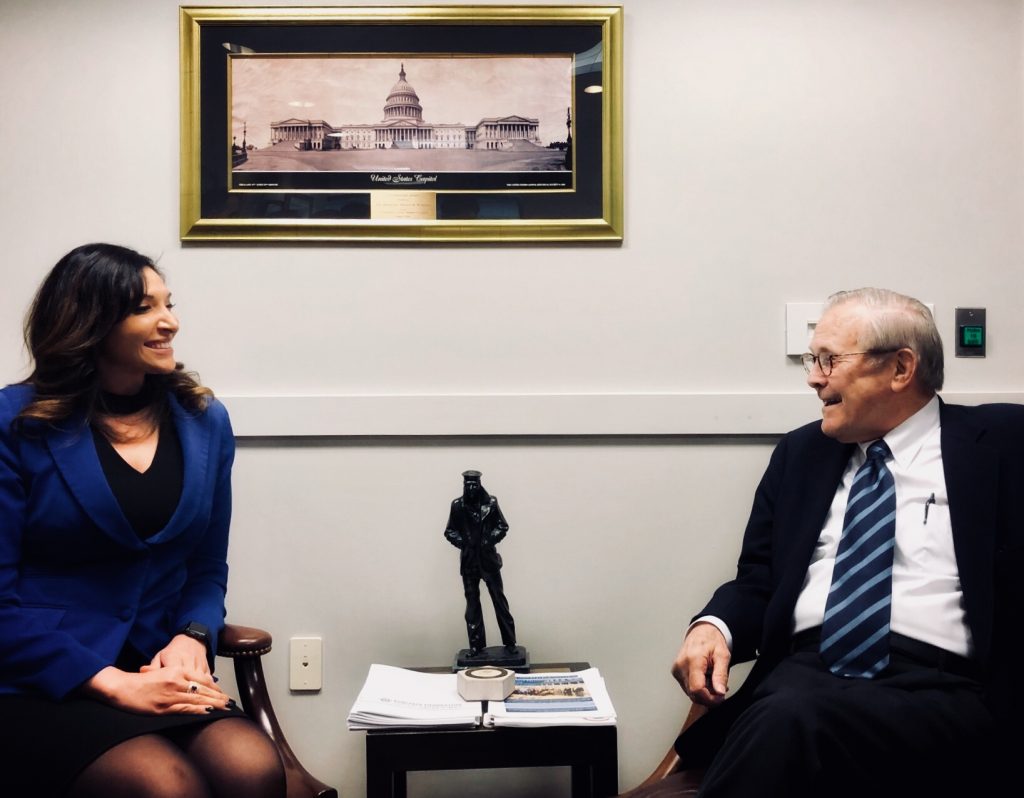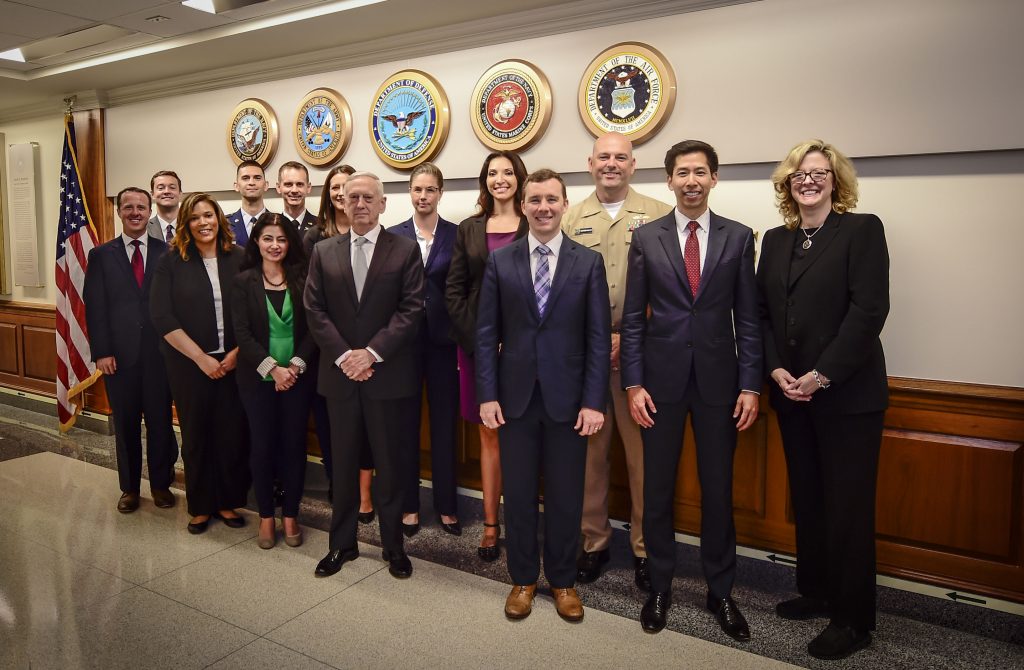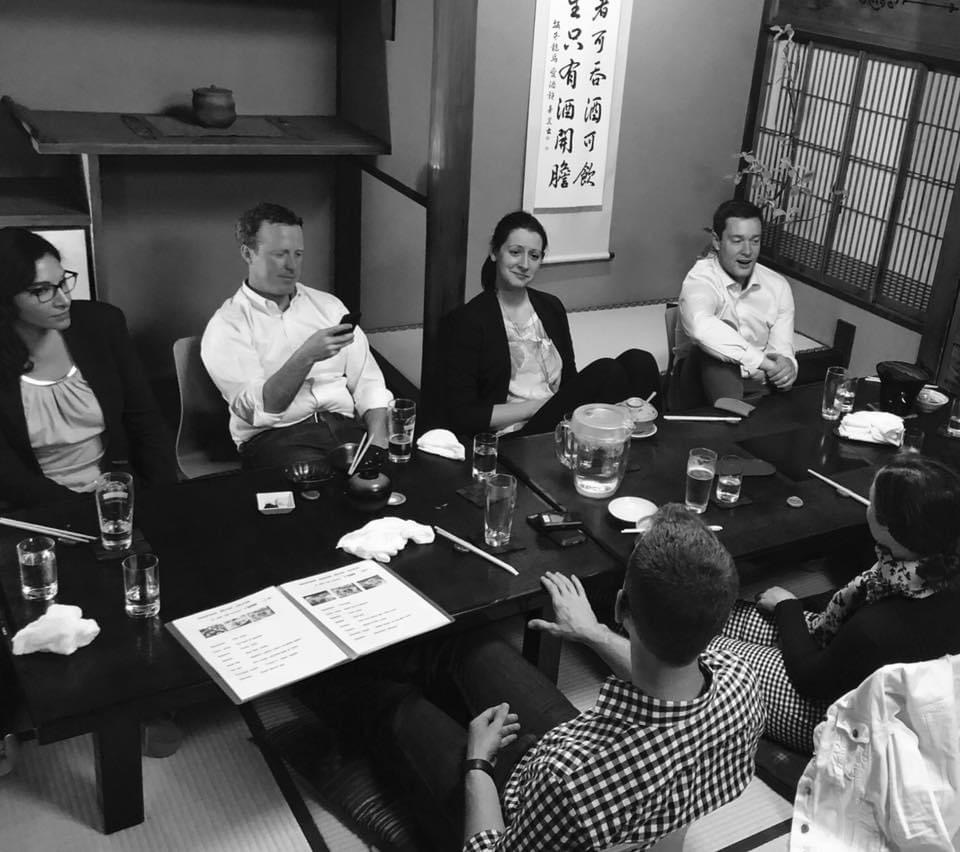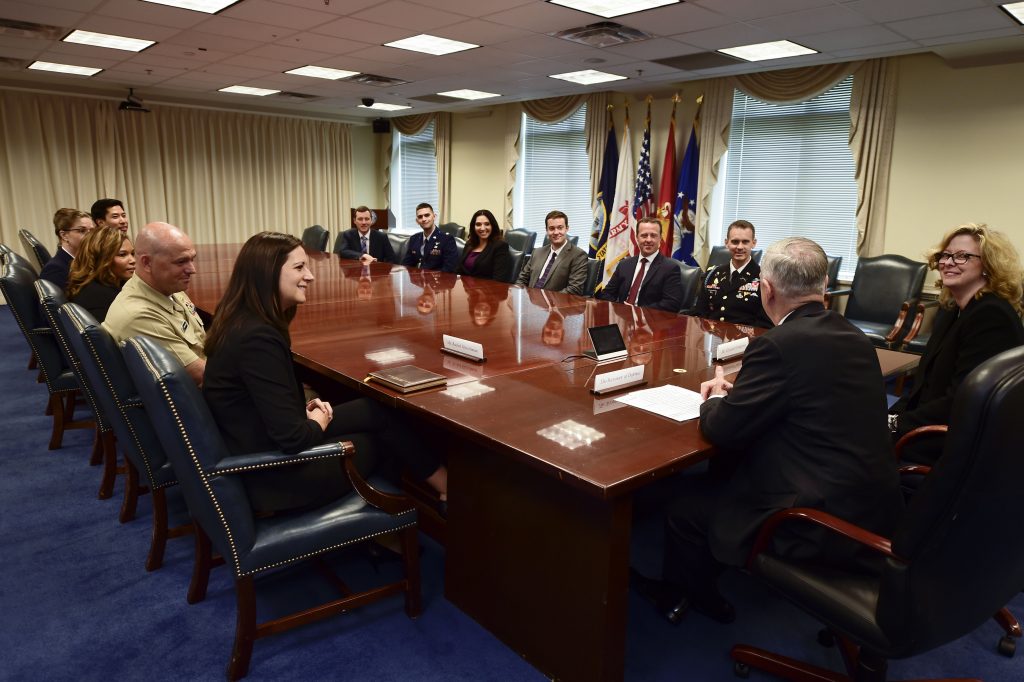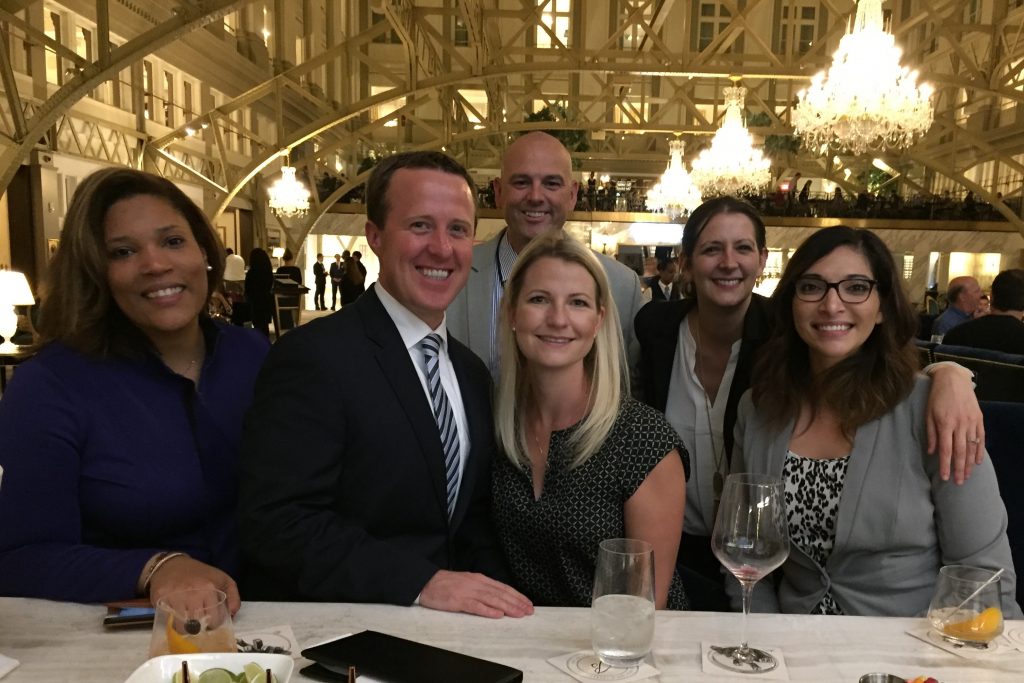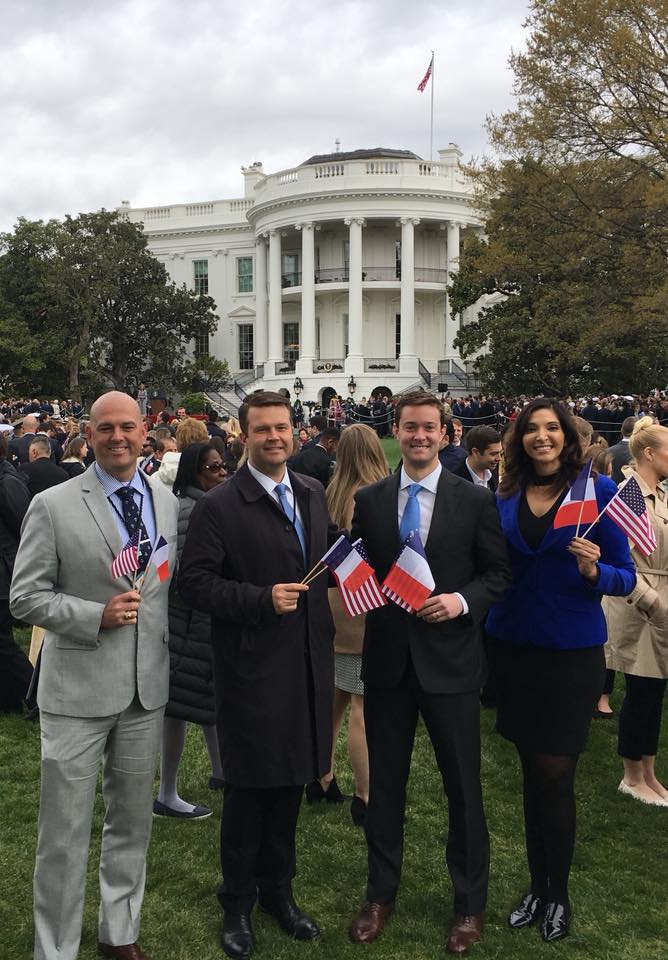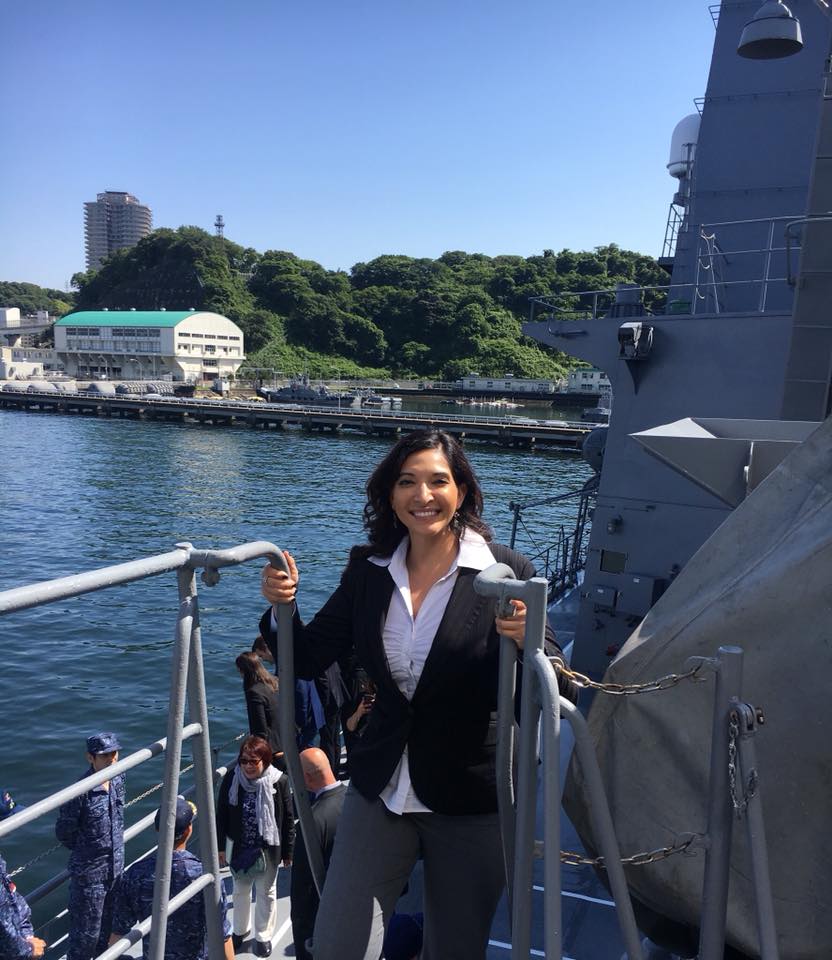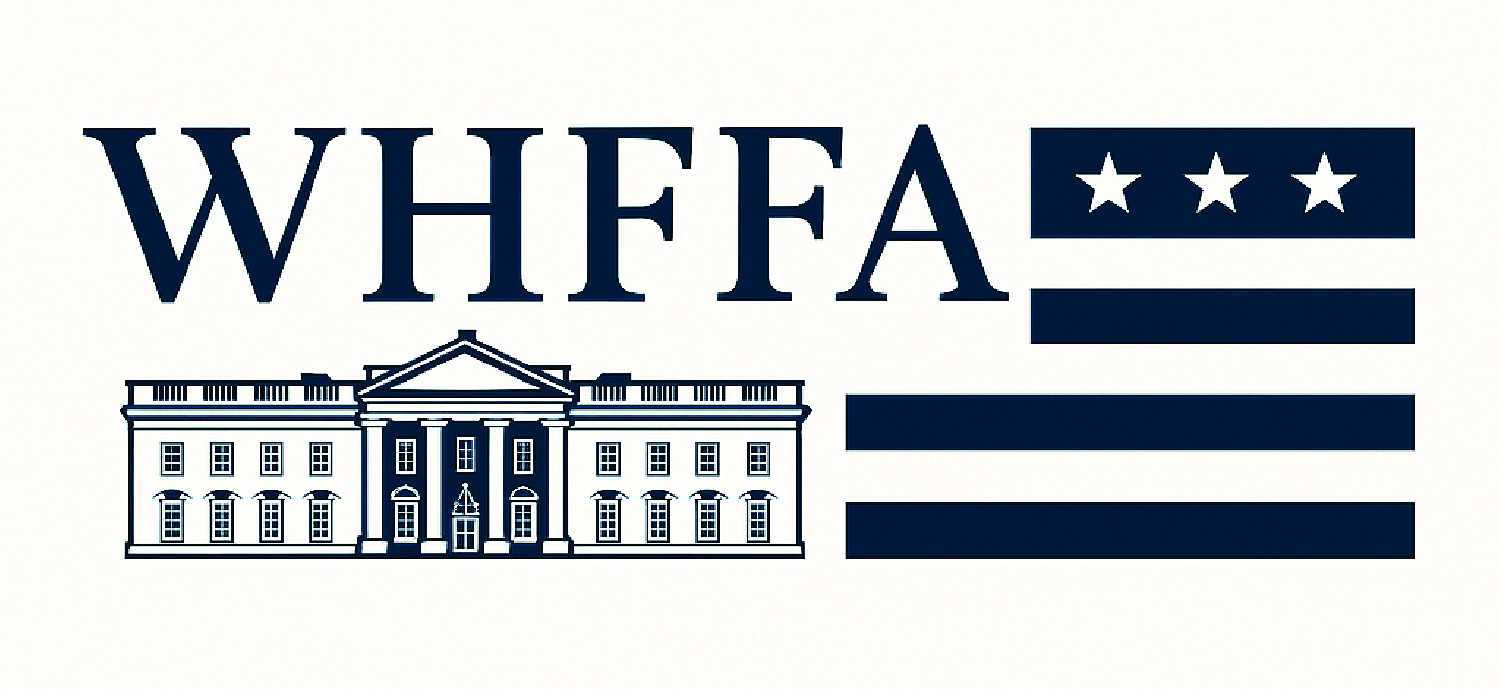WHF Profile: Cristina “Nina” Hernandez (2017-18)
How did you first hear about the White House Fellowship?
I first heard about the program 2-3 years prior to applying. A good friend of mine heard about the Fellowship from one of his mentors and thought I’d be a great fit for it. I wasn’t familiar with the program, and the word “fellowship” made me think it was for early career professionals. I thought I was too late in my career to partake in such an opportunity. I was completely wrong, however, as this program is designed specifically for mid-career professionals and helps fast track careers to the highest levels of executive leadership.
Can you tell us about yourself and your work before the White House Fellowship?
Prior to the White House Fellowship, I spent 15+ years in the national security sector as both a soldier and private sector consultant. I had joined the Army just after 9/11, and my career thus far had largely focused on the conflicts in Iraq and Afghanistan. There came a point, however, when the drawdown of forces was well underway and it looked like the end of those conflicts was in sight; it was during this period that I decided to make a career transition.
Why did you decide to apply for the program?
Fifteen years into my career, I was still as passionate about technology, policy and politics as ever, but I was also ready for a career transition. So when a new presidential election kicked off, I decided to apply to the White House Fellowship.
The first year of any new presidential administration is when you can learn the most from a political and executive leadership perspective. An entirely new leadership team takes charge across the White House, Departments and Agencies. This executive leadership team is comprised of political appointees selected by the incoming President. During my Fellowship year, most of the political appointees I worked with had never worked in government before, had never worked in the particular agency or department they were now entrusted to lead, and were not prepared for the rigors of the Senate Confirmation process. I was no different. Though I’d served in the military and consulted government clients, I had never been a government executive and I had never worked at the agency I was assigned to, the Office of Personnel Management. Being part of that change in administration presented a steep learning curve, but we all hit the ground running to learn the ropes, take charge, and quickly implement changes and improvements. I embraced the tumultuous start and welcomed the opportunity to rapidly learn and grow.
What was your Fellowship experience like? What were some of your learnings during your Fellowship year?
My Fellowship year was marked by one of the most polarized moments in our nation’s recent history. There was a lot of discord, both across society, and within the government itself. This was an added challenge for everyone stepping into a leadership position under such a politically charged climate. Being an effective leader under those circumstances wasn’t just a matter of problem solving and pragmatic solutions; it was an exercise in interpersonal skills and politicking.
Under that politically charged climate, we needed to:
- Demonstrate humility and a willingness to learn from others, regardless of titles, positions, or political affiliations.
- Show empathy and emotional intelligence to understand and address the concerns of civil servants who had long served under many previous Presidents and who were experts in their field.
- Build relationships, broker alignment, and facilitate negotiations across political lines and across both the executive and legislative branches of government, for no new policy or initiative could pass without multi-stakeholder buy-in.
- Garner trust in our vision and earn the trust of our organizations to be able to lead and succeed.
In addition to the myriad of practical lessons in leadership, I had the unique opportunity to witness firsthand the rigorous Senate confirmation process as part of my Fellowship experience. Once the President nominates a cabinet-level secretary or head of agency, the nominee is subject to approval by the Senate. The process is not so straight forward, however, as political and partisan tensions can interfere. In addition to quickly acquiring the subject matter expertise needed to prove proficiency to lead the designated organization, nominees and their future staff need to do a lot of politicking prior to the Senate confirmation hearing to assure the Senate that the nominee will work across party lines and collaborate across the branches of government to enact and implement policies, initiatives and regulations. Few people, even within the government, get to see the intricate Senate confirmation process firsthand, but thanks to the Fellowship, I saw exactly what it takes to have a seat at the highest levels of government.
Along with those lessons in leadership and politicking, I had the opportunity to enrich my professional toolbox, gaining valuable acumens that are relevant for the rest of my career. During my Fellowship year, I focused on developing policies and strategies to create a more agile workforce. Engendering adaptive individuals and high performing teams is a valuable skillset across all sectors and organizations, and the Fellowship allowed me to work alongside passionate, knowledgeable human capital managers who pooled innovative ideas and shared unique insights to promote agility and adaptability, through initiatives targeting both structural and organizational changes, and through initiatives focused on individuals and personal growth.
Lastly, on top of the amazing practical experiences the Fellowship affords, the Program is further complemented by a structured leadership and personal development program. Twice a week, we came together as a cohort for off-the-record conversations with the top government, business, and military leaders of the moment. We got to hear thoughtful, timely, relevant insights from executives at the highest levels, giving us a sneak peek into knowledge and perspectives we likely wouldn’t encounter for another 20 years in our own careers. This unique cross-pollination instilled valuable insights that armed us with the capacity to leapfrog ahead in our careers.
We also came together as a cohort on a quarterly basis for special personal development programming, giving us a chance to closely and thoughtfully examine our careers thus far, and allowing us to contemplate the next phase of our career and to create an action plan to achieve that vision. Last but definitely not least, we went on amazing leadership retreats, learning more about foreign and domestic policies, simulating national crisis responses, engaging in thoughtful fireside chats, and even tackling physical obstacle courses – all while strengthening our bond as a cohesive cohort. The entire Fellowship experience is truly enriched by the caliber and passion of the peers we serve alongside of as a cohort, and by the broad range of knowledge and experience everyone brings to the group.
How did the trajectory of your life and work change after the White House Fellowship?
Post Fellowship, I continued to diversify my professional experience by moving to Germany and advising startups. I had seen how large, well-funded organizations did business, now I wanted to learn how small, underfunded organizations were able to produce outsized results. I had the opportunity to do just that when I joined a brand-new cybersecurity startup and got to learn how to build a company from the ground up, all while executing a high visibility international project. My time abroad also enriched my tech sector expertise, as I saw firsthand the transatlantic differences in sentiments towards data privacy, pace and acceptance of tech adoption, and tech regulatory environments.
The White House Fellowship afforded me the opportunity to make a mid-career transition while instilling valuable lessons and skills that will serve me well for the rest of my career. After 20+ years working across sectors and across types of organizations – government, private sector corporations, and agile startups – I learned that most skills are portable and transferrable, so long as you have an adaptive mindset. Thanks to my experiences during the Fellowship, and to the doors it opened for me afterwards, I deeply trust in my ability to thrive in any environment, with any client, on any team, and under any circumstances.
What are the top 3 pieces of advice you would give to prospective applicants?
1. Get really clear on why you want to apply for this program by asking yourself the 3 why’s:
- Why YOU? – What is so unique about you, specifically, versus other candidates like you, with similar backgrounds and experiences?
- Why THIS? – What is so unique about this particular experience, that you couldn’t get anywhere else? What does this experience provide that you can’t get in your current career trajectory? Why this particular program, instead of other leadership programs out there?
- Why NOW? – Why is this particular moment the critical inflection point in your life and/or career?
2. You can and SHOULD be networking with past WHF candidates and alumni! White House Fellows care about the caliber and success of the program and its participants, and as alumni, we always appreciate the opportunity to pay it forward.
If you are interested in the program, seek out alumni you have common ground with, such as alumni who:
- Are in your career field
- Are from your alma mater
- Are from your hometown
- Are part of the same professional networks
- Were placed at the organization you would like to be placed in
- Et cetera
If possible, try to also connect with candidates who were NOT selected for the program. These candidates may provide valuable insights and give you thoughtful feedback to strengthen your own candidacy.
3. Don’t let party politics get in the way of this amazing opportunity. Regardless of your political affiliation, and regardless of the political affiliation of the Presidential Administration when you apply to the program, there is a wealth of knowledge to be learned and experience to be gained through this amazing program. The power to influence – and therefore the power to lead – is best honed precisely when there is discord. This program will encourage you to engage in thoughtful discourse and collaboration across the aisle, it will inspire you to contemplate and understand diverse perspectives, and it will teach you to broker alignment across a wide range of stakeholders – regardless of which party is in office.
So go ahead. Ask yourself the 3 why’s. And APPLY!
